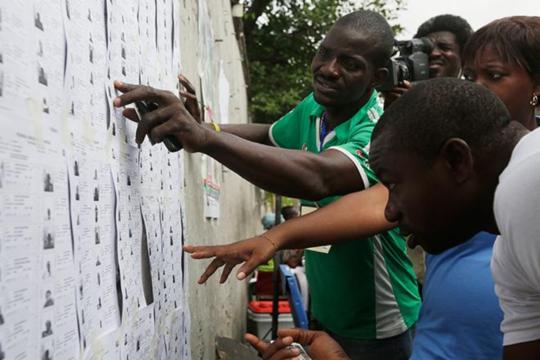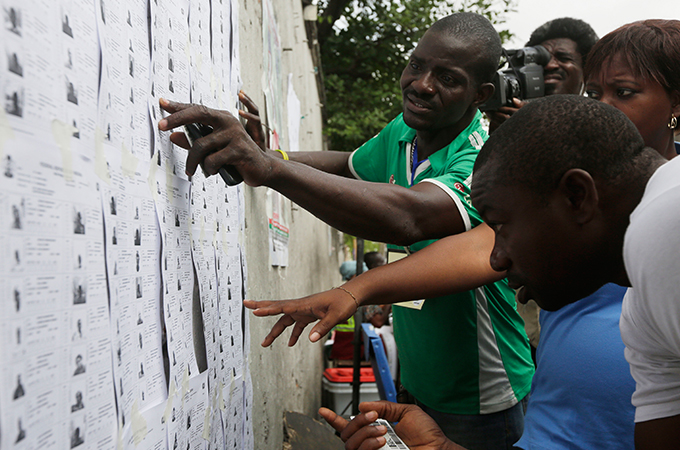
 |
| [Associated Press] |
| Abstract Nigerian politics have been marred by coups and corruption over the years. This report argues that the recent election of Muhammadu Buhari marks a different era in Nigerian politics. It is the first time in Nigeria’s history that a candidate from the opposition party wins elections. Furthermore, the timing of the handover and its peaceful nature is noteworthy. This report offers a brief background on the incoming president and discusses the challenges he faces as Nigeria embarks on a new path of political and economic recovery. |
Introduction
Post-colonial challenges continue to affect growth in many African countries. The most dire among these challenges are low education levels and high rates of unemployment, especially among youth. The National Population Commission states about half of the population is made up of youth, defined as individuals between 15 and 34 years of age.(1) Unfortunately, as the youth population grows, so does the unemployment rate. In fact, unemployed youth numbered about 11.1 million in 2012.(2) Unfortunately, in most African countries, the resources to address these challenges are utilized for personal political objectives rather than for growth. African politicians have a tendency of spending most of the time and resources to preserve and prolong their political offices instead of furthering electoral political mandates. The preoccupation with political survival has led to the relegation of key projects like education and health to the periphery. Consequently, most African nations continue to rank very poorly in meeting basic human development needs such as employment, education and health. The inability to meet these demands proliferate various socio-political ills in Africa.
Nigeria carries the brunt of these challenges. It is the most populous country in Africa, has the second biggest economy, is the third largest military power and the biggest oil producer (tenth oil producer in the world). Its seven most populous cities each house more than one million people, and about one out of two West Africans is from Nigeria.(3) President Goodluck Jonathan has been criticized for not prioritizing major social problems in Nigeria. His leadership clearly illustrated several flaws in tackling terrorism, corruption and fair distribution of basic government services, particularly in the northern part of Nigeria. Many argue that the dismal failure in dealing with these challenges contributed to attracting many Nigerians, especially youth, to crime and to the Boko Haram terrorist organisation. His rise to power came in 1999 after the governor of Bayelsa, Diepreye Abmieyeseigha, was impeached, removed from office and replaced with Goodluck Jonathan. President Jonathan’s governorship of Bayelsa ended in 2005 after he was elected to the Deputy Presidency of the Federal State of Nigeria. Following the death of President Umaru Yar’Adua in 2010, a motion was passed by the Nigerian Senate which inaugurated Goodluck Jonathan as the acting President of Nigeria. Elections were held in 2010 and Goodluck Jonathan was elected president of Nigeria.
The defeat of Goodluck Jonathan by 72-year-old Muhammadu Buhari in the recent elections did not come as a surprise to many people who have been observing Nigerian politics over the years. Muhammadu Buhari’s involvement in politics is not new. He, like many past leaders of Nigeria, hails from the military apparatus. However, Buhari is more well-known internationally for leading a 1983 military coup in Nigeria. He contested the elections in 2010 but lost to Goodluck Jonathan. His victory at the recent polls was due to a combination of things, some of them mentioned in the above paragraphs, including President Goodluck’s failure in effectively tackling terrorism, corruption and high unemployment. In addition, many Nigerians see Muhammadu Buhari’s Islamic and military backgrounds as key in the fight against terrorism.
New era in Nigerian politics
The number of votes for Muhammadu Buhari suggests that there he received electoral support across religious lines. The religious divide, which has always existed in Nigeria, seems to have at least narrowed during these elections. This is good news for Nigerian politics and a great window of opportunity that can be utilised in a positive manner by the incoming president. In other words, the new government has a good chance to lead in this regard by installing mechanisms to fight and eradicate sectarianism, because the continuing polarization of the Nigerian people along religious lines remains a great challenge for the country.
However, for Nigeria to succeed in this regard, the new government must be perceived as fairly delivering basic services to all Nigerians rather than prioritizing their own constituencies. Moreover, Muhammado Buhari will have to be careful when forming his new cabinet. He has to be inclusive and avoid the pitfall that many African countries still suffer, that of political rather than merit-based appointment to government positions that require technical skills. A qualified and dedicated cabinet will have to be established if the social, economic and political challenges of Nigeria are to be addressed and eventually eradicated.
Finally, the country has achieved what seemed unimaginable if its political history is to be used as a yardstick. The positive and peaceful transition of power signals a new era in Nigeria. It is also the first time that a candidate from the opposition party managed to win the elections. Muhammadu Buhari defeated President Goodluck Jonathan by a clear margin. According to the Independent National Electoral Commission (INEC), Buhari received 15,424,921 votes, and President Goodluck Jonathan 12,853,162 votes.(4)
Urgent needs on the path to economic and political recovery
The new government will inherit a sluggish economy and a scourge of corruption that permeates most clusters of government in Nigeria. Although the economy seems to be growing, the economic growth benefits have failed to trickle down to the larger population. A Nigerian study points out that considering its income per capita only, nothing has changed since 1970. Nevertheless, the country has become much richer thanks to the exploitation of its oil resources. Thus, despite being the third biggest economy in Africa, Nigeria ranks 160 out of 177 countries on the scale of the Human Development Index (HDI).(5) The wealth remains concentrated within a very small group of individuals, most of whom have strong political connections. According to the statistics released in 2012, youth unemployment in Nigeria is as high as fifty per cent.(6) Having said that, it is fair to assess that Goodluck Jonathan leaves a relatively stable economic environment that is in transformation and enthusiastic for business. It is important to note that during his presidency, Nigeria became the largest economy in Africa, surpassing that of South Africa.
Secondly, it is critical that the first days of the new government deal with terrorism. The new government’s success will be determined by how effectively it tackles the security threats presented by Boko Haram. Though the Nigerian military recently made gains against Boko Haram militants, Jonathan never dealt a decisive blow against the extremist group, even after they declared a caliphate in the country's northern regions. The militants killed at least 10,000 people last year and forced about 1.5 million to flee for southern Nigeria and neighbouring countries.(7) Furthermore, the willingness to work with other countries within the region in fighting terrorism will also be key. Goodluck Jonathan’s government was accused of dragging its feet in this regard. Muhammadu Buhari brings with him necessary ingredients to succeed in pushing back Boko Haram, including his Muslim background, proximity and understanding of areas were Boko Haram dominates. Furthermore, his military background will be an added advantage.
Finally, Ebola will continue for some time to come to threaten regional stability. Ebola has not been completely eradicated in the region, and many countries are still battling this epidemic. Consequently, Nigeria will not be free of Ebola’s threat until it is totally eradicated in the region. Failed regional leadership coordination in dealing with Ebola will have to improve if the spread of the epidemic is to be halted. The federation has been quick in the past to declare that it was free of Ebola only to discover more cases afterwards. Across borders, people often belong to the same tribe and speak the same local languages Most families in Nigeria actually have cross-border family relations, further complicating the fight against Ebola.
Conclusion
Goodluck Jonathan’s presidency failed to address many socioeconomic and political challenges Nigeria. The failure to bring back over 200 girls kidnapped from the Chibok boarding school in Borno state in Nigeria, terrorism, a sluggish economy and high unemployment remain great challenges for Nigeria.
However, some analysts believe that Jonathan’s political legacy and reputation were salvaged by statements he made before, during and after the elections. Even though there were indications that Muhammadu Buharu was the winner, Goodluck Jonathan conceded defeat before the INEC delivered the official results. There were predictions by various pundits that Nigeria could erupt into violence after the elections, particularly in the Niger Delta; however, Jonathan’s pronouncements quelled that possibility.
__________________________________________
Copyright © 2015 Al Jazeera Centre for Studies, All rights reserved.
*Thembisa Fakude is Head of Research Relations at AlJazeera Centre for Studies.
References
1. Tunji Akande, “Youth Unemployment in Nigeria: A Situation Analysis, Africa in Focus”, Brookings, 23 September 2014, http://www.brookings.edu/blogs/africa-in-focus/posts/2014/09/23-youth-unemployment-nigeria-akande ; accessed 14 April 2015.
2. West Africa Gateway Nigeria,
http://www.oecd.org/swac/publications/Nigeria_e-version_en_light.pdf ; accessed 14 April 2015.
3. Independent National Electoral Commission, Election Results, http://www.inecnigeria.org/?page_id=31 , accessed 14 April 2015.
4. Poverty.org, “Research for Social and Economic Development: Poverty in Nigeria, Rich Country, Poor People”, Poverty.org, April 2013,
http://www.poverties.org/poverty-in-nigeria.html#sthash.t5tCef1x.dpuf , accessed 14 April 2015.
5. Omoh Gabriel, “Youth Unemployment in Nigeria Up To 50% —Mckinsey & co”, Vanguard, 26 January 2015, http://www.vanguardngr.com/2015/01/youth-unemployment-nigeria-50-mckinsey-co/#sthash.qHwcL1gs.dpuf , accessed 14 April 2015.
6. Ali Abare Abubakar, “Nigerian’s New President Pledges to Crush Boko Haram”, USA Today, 1 April 2015, http://www.usatoday.com/story/news/world/2015/04/01/nigeria-election-buhari-profile/70769892/ , accessed 14 April 2014.
7. Associated Press, “Nigerian Extremists Pose Regional Threat”, New York Times, 21 December 2014; http://www.nytimes.com/aponline/2014/12/21/world/africa/ap-af-nigeria-violence.html , accessed 14 April 2015.
